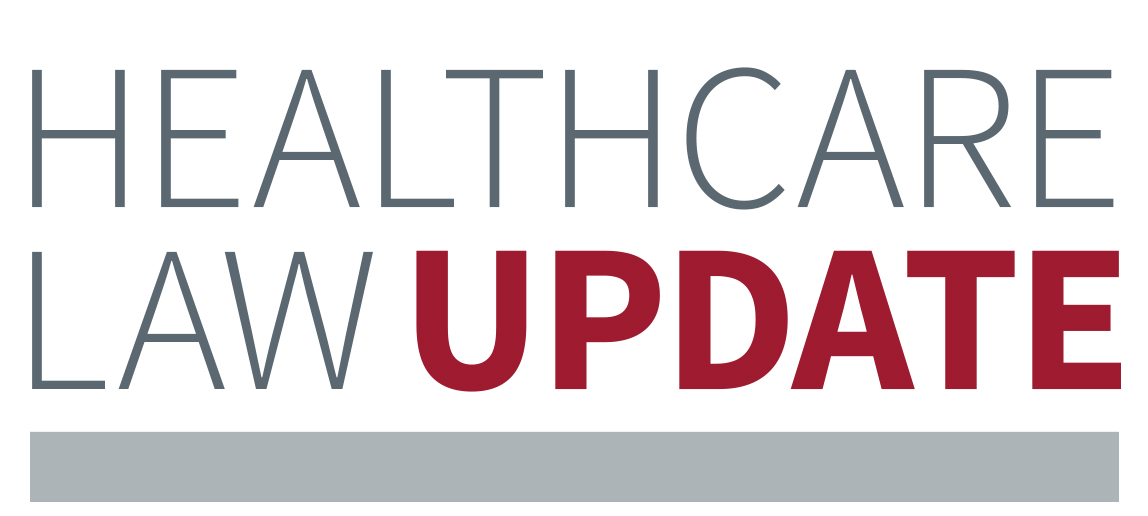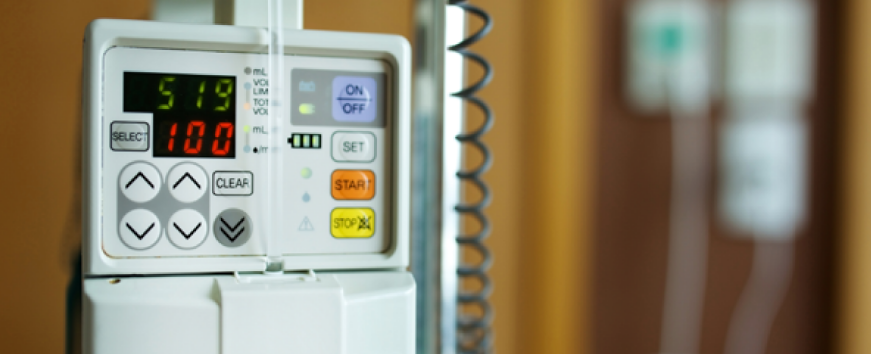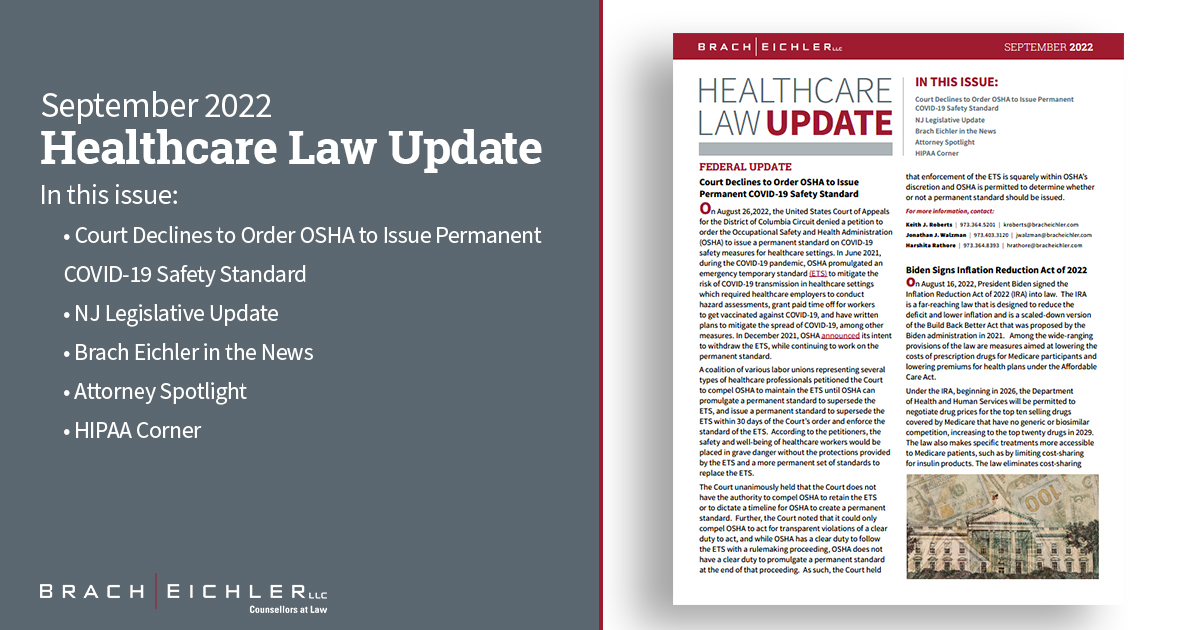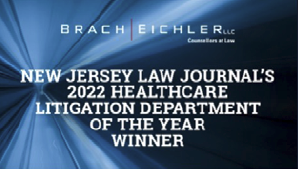

On August 26,2022, the United States Court of Appeals for the District of Columbia Circuit denied a petition to order the Occupational Safety and Health Administration (OSHA) to issue a permanent standard on COVID-19 safety measures for healthcare settings. In June 2021, during the COVID-19 pandemic, OSHA promulgated an emergency temporary standard (ETS) to mitigate the risk of COVID-19 transmission in healthcare settings which required healthcare employers to conduct hazard assessments, grant paid time off for workers to get vaccinated against COVID-19, and have written plans to mitigate the spread of COVID-19, among other measures. In December 2021, OSHA announced its intent to withdraw the ETS, while continuing to work on the permanent standard.
A coalition of various labor unions representing several types of healthcare professionals petitioned the Court to compel OSHA to maintain the ETS until OSHA can promulgate a permanent standard to supersede the ETS, and issue a permanent standard to supersede the ETS within 30 days of the Court’s order and enforce the standard of the ETS. According to the petitioners, the safety and well-being of healthcare workers would be placed in grave danger without the protections provided by the ETS and a more permanent set of standards to replace the ETS.
The Court unanimously held that the Court does not have the authority to compel OSHA to retain the ETS or to dictate a timeline for OSHA to create a permanent standard. Further, the Court noted that it could only compel OSHA to act for transparent violations of a clear duty to act, and while OSHA has a clear duty to follow the ETS with a rulemaking proceeding, OSHA does not have a clear duty to promulgate a permanent standard at the end of that proceeding. As such, the Court held
that enforcement of the ETS is squarely within OSHA’s discretion and OSHA is permitted to determine whether or not a permanent standard should be issued.
For more information, contact:
Keith J. Roberts | 973.364.5201 | kroberts@bracheichler.com
Jonathan J. Walzman | 973.403.3120 | jwalzman@bracheichler.com
Harshita Rathore | 973.364.8393 | hrathore@bracheichler.com
On August 16, 2022, President Biden signed the Inflation Reduction Act of 2022 (IRA) into law. The IRA is a far-reaching law that is designed to reduce the deficit and lower inflation and is a scaled-down version of the Build Back Better Act that was proposed by the Biden administration in 2021. Among the wide-ranging provisions of the law are measures aimed at lowering the costs of prescription drugs for Medicare participants and lowering premiums for health plans under the Affordable Care Act.
Under the IRA, beginning in 2026, the Department of Health and Human Services will be permitted to negotiate drug prices for the top ten selling drugs covered by Medicare that have no generic or biosimilar competition, increasing to the top twenty drugs in 2029. The law also makes specific treatments more accessible to Medicare patients, such as by limiting cost-sharing for insulin products. The law eliminates cost-sharing

for adult vaccines under Medicare Part D and Medicaid. The law also imposes penalties on drug companies who increase prices faster than the rate of inflation, including mandating rebates to Medicare beneficiaries and imposing tax penalties. In addition, out-of-pocket expenses for prescription drugs for Medicare Part D beneficiaries will be capped at $2,000 per year beginning in 2025, and Part D premium cost growth will be capped at 6% from 2024 to 2029. The IRA also caps insulin costs for Medicare beneficiaries at $35 a month.
The IRA also extends certain subsidies available to enrollees in plans under the Affordable Care Act through 2025. These subsidies would have otherwise expired at the end of 2022. The IRA also expands the eligibility requirements to allow more middle-class people to qualify for these subsidies. The subsidies are available to those eligible to purchase health plans in the Affordable Care Act Marketplaces, and starting in 2024, will be available to people with incomes between 135% and 150% of the federal poverty level.
For more information, contact:
John D. Fanburg, Chair | 973.403.3107 | jfanburg@bracheichler.com
Jonathan J. Walzman | 973.403.3120 | jwalzman@bracheichler.com
Susan E. Frankel | 973.364.5209 | sfrankel@bracheichler.com
On June 6, 2022, the Office of Inspector General (OIG) of the U.S. Department of Health and Human Services (HHS) released its Semiannual Report to Congress (the Report), which summarizes the agency’s activities from October 1, 2021, through March 31, 2022.
The Report highlights nearly $3 billion in expected recoveries as a result of the OIG’s audits and investigations. The OIG reported 320 criminal actions relating to HHS programs and an additional 320 civil actions involving false claims and unjust enrichment, civil monetary penalty settlements, and recoveries from provider self-disclosures. Moreover, the OIG excluded 1,043 individuals and entities from participation in federal healthcare programs.
In the Report, the OIG explains its use of data analytics to detect trends and outliers. The OIG noted that it performs analyses in evolving and emerging areas, including telehealth and cybersecurity. The OIG continues to focus on significant and high-risk issues in healthcare, including responding to the COVID-19
pandemic and other emergencies, improving oversight of nursing homes, ensuring the health and safety of vulnerable populations, preventing and treating opioid misuse, and ensuring program integrity for federal healthcare programs.
For more information, contact:
Lani M. Dornfeld, CHPC | 973.403.3136 | ldornfeld@bracheichler.com
Edward J. Yun | 973.364.5229 | eyun@bracheichler.com
James Ko | 973.403.3147 | jko@bracheichler.com
The Centers for Medicare & Medicaid Services (CMS), in its effort to reduce redundancy and improve efficiency, released on May 23, 2022 its decision to eliminate the need for Certificates of Medical Necessity (CMNs) and Durable Medical Equipment (DME) Information Forms (DIFs). This change takes effect beginning on January 1, 2023, and directly impacts providers, suppliers, billers, and vendors who bill CMS for services and equipment provided to Medicare patients. CMS previously required the submission of CMNs and DIFs to document medical necessity and other coverage criteria for selected DME. Such forms had to be submitted with a claim to receive reimbursement. After January 1, 2023, claims for services involving the following specific items will not require the submission of either a CMN or DIF: CMS-484 Oxygen, CMS 846 – Pneumatic Compression Devices, CMS 847 – Osteogenesis Stimulators, CMS 848 – Transcutaneous Electrical Nerve Stimulators, CMS 849 – Seat Lift Mechanisms, CMS 854 – Section C Continuation Form, SMS 10125 – External Infusion Pumps, CMS 10126 – External and Parenteral Nutrition. If those forms are submitted with claims after January 1, 2023, CMS will reject the claim in its entirety.
For more information, contact:
Isabelle Bibet-Kalinyak | 973.403.3131 | ibibetkalinyak@bracheichler.com
Edward Hilzenrath | 973.403.3114 | ehilzenrath@bracheichler.com
Erika R. Marshall | 973.364.5236 | emarshall@bracheichler.com


On June 15, 2022, in a 9-0 opinion in the case of, American Hospital Association v. Xavier Becerra, Secretary of Human Health Services, the U.S. Supreme Court unanimously held that in 2018 and 2019, the Department of Health and Human Services (HHS) unlawfully varied the rate of reimbursement for outpatient prescription drugs provided by 340B hospitals. The 340B program allows hospitals and providers serving low-income patients and vulnerable communities access to outpatient drugs at discounted prices. 340B hospitals save on average 25-50% in pharmaceutical purchases but are later reimbursed at the prevailing rates by insurers. This allows 340B hospitals to use the savings to provide free services for uninsured patients and cover other costs.
In 2018 and 2019, HHS reduced the reimbursement rate of specified covered outpatient drugs for 340B hospitals from 106% of the average sales price, to 77.5% of the average sales price. HHS reasoned that under applicable law, it had the statutory authority to calculate and adjust drug prices. Essentially, HHS sought to eliminate any unfair advantage 340B hospitals might experience from having significantly discounted drugs and high rates of reimbursement. The Supreme Court agreed that HHS had the statutory authority to establish the rate of reimbursement. However, the Court found that the law required HHS to establish the rate of reimbursement in one of two ways: either collect survey data of the specific hospitals’ acquisition cost for outpatient drugs or, if cost data from the hospitals are unavailable, collect cost data from the drug manufacturer. The Court held that because HHS did not survey the 340B hospitals’ acquisition costs, HHS was not afforded the discretion to reduce reimbursement to 77.5% of the average sales price.
For more information, contact:
John D. Fanburg, Chair | 973.403.3107 | jfanburg@bracheichler.com
Caroline J. Patterson | 973.403.3141 | cpatterson@bracheichler.com
Emily J. Harris | 973.364.5205 | eharris@bracheichler.com
The Advancing Telehealth Beyond COVID-19 Act of 2022 (H.R. 4040) passed in the U.S. House of Representatives on July 27, 2022 and the bill is headed to the Senate for a vote. This bill seeks to extend certain Medicare telehealth flexibilities after the end of the COVID-19 public health emergency. Specifically, the bill provides that certain flexibilities continue to apply until December 31, 2024, if the emergency period ends before that date. The bill includes the following proposed flexibilities: removing geographic requirements and expanding originating sites for telehealth services; expanding the designated practitioners who are eligible to furnish telehealth services; expanding telehealth services for Federally Qualified Health Centers and Rural Health Clinics; continuing coverage and payment for audio-only telehealth services; and allowing the face to face hospice recertification visit to be performed via telehealth. The bill also seeks to delay in-person requirements under Medicare for mental health services furnished through telehealth and telecommunications technology until January 1, 2025, or the first day after the end of the emergency period, whichever is later.
On August 26, 2022, the Departments of Health and Human Services, Treasury and Labor, issued final rules, with an effective date of October 25, 2022, to implement the No Surprises Act, which bans surprise medical bills. The final rules provide new details for the independent dispute resolution process to determine an out-of-network rate for items and services. The final rules reduce the emphasis on the qualifying payment amount (QPA), meaning the median contracted rate for a given service in a given market. The final rules require that arbiters offer a rate that best quantifies the value of the item or service under dispute considering the QPA and all permissible factors.
On July 18, 2022, The New Jersey Department of Health revoked certain COVID-19 related temporary rule waivers/modifications; these include temporary waivers/ modification related to collection stations, ambulances, and licensing/certification. The Commissioner of the
Department of Health found that revocation of these temporary rule waivers/modifications was necessary because enforcement of the original rules would no longer be detrimental to the public welfare.
The Ensuring Transparency in Prior Authorization Act was reported out of the Assembly Health Committee of the New Jersey State Legislature on May 26, 2022. If enacted, the bill places the onus on insurance carriers and utilization review entities acting on behalf of such carriers to make certain disclosures including statistics concerning approvals and denials, comply with deadlines to render a prior authorization or adverse determination, and notify the policyholder and the subscriber’s health care provider of same within one calendar day, or within 24 hours if it concerns an urgent health care service. If a utilization review entity fails to comply with a deadline or other requirement under the bill, then any health care services subject to review will be automatically authorized.
For more information, contact:
Isabelle Bibet-Kalinyak | 973.403.3131 | ibibetkalinyak@bracheichler.com
Caroline J. Patterson | 973.403.3141 | cpatterson@bracheichler.com
Vanessa Coleman | 973.364.5208 | vcoleman@bracheichler.com
On August 17, 2022, a New Jersey judge dismissed a lawsuit that was filed against a nursing home when one of its nursing home residents contracted COVID-19 and died.
The estate of the decedent alleged that the nursing home failed to implement proper COVID-19 protocols and procedures and employ proper infectious disease control procedures. In defending the allegations, the nursing home argued that it is shielded from liability under P.L. 2020, Chapter 18, a law signed by Governor Phil Murphy on April 14, 2020. According to this law, (i) a health care professional cannot be held liable for civil damages for injury or death in the course of providing medical services in support of the State’s response to the coronavirus outbreak during the public health emergency and state of emergency and (ii) a health care facility or health care system that owns or operates more than one health care facility will not be held liable for civil damages for injury or death alleged to have
been sustained as a result of an act or omission by its agents, officers, employees, servants, representatives or volunteers if such individual is immune from liability according to paragraph (i). Immunity also applies to acts or omissions taken in good faith to support efforts to treat COVID-19 patients during the public health emergency and state of emergency declared by the Governor. The immunity does not extend to conduct constituting a crime, actual fraud, actual malice, gross negligence, recklessness, or willful misconduct.
The judge dismissed the lawsuit because the court could not glean “a cause of action beyond negligence” and the “allegations within the complaint regarding gross negligence and recklessness lack specificity and are altogether too general”. The action was dismissed without prejudice, and the estate may file an amended complaint.
For more information, contact:
Riza I. Dagli | 973.403.3103 | rdagli@bracheichler.com
Edward J. Yun | 973.364.5229 | eyun@bracheichler.com
Cynthia J. Liba | 973.403.3106 | cliba@bracheichler.com
The New Jersey Division of Consumer Affairs (DCA) published a notice discontinuing the Temporary Emergency Reciprocity License (TERL) program effective August 1, 2022, for the following health care practitioners:
• Advanced Practice Nurse
• Certified Social Worker
• Doctor of Osteopathy
• Homemaker Home Health Aid
• Licensed Practical Nurse
• Licensed Alcohol and Drug Counselor
• Licensed Clinical Social Worker
• Licensed Social Worker
• Marriage and Family Therapist
• Medical Doctor
• Professional Counselor
• Psychoanalyst
• Psychologist
• Registered Professional Nurse
Get to know the faces and stories of the people behind the articles in each issue. This month, we invite you to meet Member Jonathan Walzman and Associate Vanessa Coleman.

Briefly describe a recent significant transaction, win or client victory.
We recently represented an ambulatory surgery center in the sale of a controlling interest to a national healthcare company for a purchase price in excess of $80,000,000. There were over 30 physician owners who were selling ownership interests as part of the transaction, and it was especially challenging to make sure that each owner would be satisfied with the outcome of the transaction.
Why did you choose to focus your legal practice on healthcare law and the healthcare industry?
I began my career as a general corporate and M&A attorney, but knew that it would be difficult to distinguish myself as a corporate generalist without focusing on a particular industry. I have always been fascinated by the healthcare field and the business of healthcare. Healthcare continues to change, and that presents both new challenges and new opportunities for healthcare providers. Through my practice, I am able to help medical providers meet these challenges and benefit from these new opportunities.

Briefly describe a recent significant transaction, win or client victory.
I drafted a Motion to Compel Answers to Interrogatories on behalf of a physician litigating a matter against a hospital involving his medical staff privileges and discriminatory conduct. The Judge granted the motion and ordered defendants to answer by a date certain.
Why did you choose to focus your legal practice on healthcare law and the healthcare industry?
I attended Seton Hall University School of Law where I concentrated in health law. It was a great introduction into the field. I have chosen to pursue a career in healthcare law because the healthcare industry is continually emerging and evolving.
During the COVID-19 public health emergency, the TERL program waived some of New Jersey’s professional licensure requirements and enabled health care practitioners licensed in other states to quickly and legally obtain emergency licenses and treat patients in New Jersey.
Effective September 1, 2022, TERL license holders must refrain from practicing in New Jersey unless they participate in a bridge program by filing an application for a New Jersey plenary license. Any TERL license holder who had applied by August 31, 2022, will qualify for the bridge program and will be authorized to continue practicing in New Jersey until the earliest of: (i) the date of issuance of a New Jersey plenary license; (ii) the date of notification of denial of the application for a New Jersey plenary license; or (iii) the end of the day on March 31, 2023.
If a TERL license holder who has not filed an application for a New Jersey plenary license continues to practice in New Jersey after September 1, 2022, the individual will be engaging in the unlicensed practice of a profession and may be subject to civil or criminal penalties.
For more information, contact:
Joseph M. Gorrell | 973.403.3112 | jgorrell@bracheichler.com
Edward J. Yun | 973.364.5229 | eyun@bracheichler.com
James Ko | 973.403.3147 | jko@bracheichler.com
On August 23, 2022, the Department of Health & Human Services, Office for Civil Rights (OCR) announced that it settled alleged HIPAA violations with a dermatology practice under a settlement agreement under which the practice is required to pay a civil penalty of $300,640 and to implement the terms of a two-year corrective action plan. At issue were allegations that the provider discarded empty specimen containers in a garbage dumpster located in the parking lot of the provider’s offices, each with a label containing the patient name, date of birth, date of sample collection, and the name of the provider who took the specimen. The OCR found potential violations of the
HIPAA Privacy Rule, including the impermissible use and disclosure of protected health information (PHI).
“Improper disposal of protected health information creates an unnecessary risk to patient privacy,” said Acting OCR Director Melanie Fontes Rainer. “HIPAA regulated entities should take every step to ensure that safeguards are in place when disposing of patient information to keep it from being accessible by the public.”
This settlement should serve as a reminder to health care providers and their business associates of the absolute need to use caution when discarding any documents or
items containing PHI, even minimal amounts of PHI. Proper disposal might include, for example, engaging a shredding contractor to destroy or shred items and documents and providing a certificate of destruction or shredding to the provider. All such documents should be saved with the business’s HIPAA records for a period of at least six years.
For more information on recognized security practices or for assistance with your HIPAA privacy and security program, contact:
Lani M. Dornfeld, CHPC | 973.403.3136 | ldornfeld@bracheichler.com

• Prosecutions for Prescribing Opioids Must Prove Criminal Intent, says SCOTUS, August 11
• DCA Better Aligns COVID-19 Protocols for Office Practices with Current Guidance, August 19
• PIP Update – NJ Federal Court Refuses to Dismiss Insurance Fraud Cases Against Physicians, August 30
• Optometry Practice Sues EMR Vendor for Crash of EMR System and Total Loss of Patient Records, September 6
• New Jersey Law Protects Health Care Workers During Ownership Change of Control, September 23

On August 10, The New Jersey Law Journal announced this year’s honorees for the 2022 New Jersey Legal Awards. Brach Eichler is honored to be a finalist for “Law Firm of the Year,” one of only three firms selected this year. Additionally, for the 2nd year in a row, the firm has been named the “Litigation Department of the Year” for our specialty practice in Healthcare Law.
On August 15, Healthcare Law Member Isabelle Bibet-Kalinyak presented a webinar about “Fair Market Value and Legal Considerations for Healthcare Organizations.”
On August 18, “Twenty Nine Total Brach Eichler Attorneys Recognized by Best Lawyers in America® 2023.”
Come visit Isabelle Bibet-Kalinyak at the American Academy of Ophthalmology conference September 30 to October 3rd, 2022, in Chicago at McCormick Place Convention Center and ask the expert! Make an appointment at the Academy Resource Center at Booth 1408.
We are pleased to welcome Sally Olson, Associate, to our Healthcare Law Practice.

Attorney Advertising: This publication is designed to provide Brach Eichler LLC clients and
contacts with information they can use to more effectively manage their businesses. The contents
of this publication are for informational purposes only. Neither this publication nor the lawyers who
authored it are rendering legal or other professional advice or opinions on specific facts or matters.
Brach Eichler LLC assumes no liability in connection with the use of this publication.

Riza I. Dagli | 973.403.3103 | rdagli@bracheichler.com
Lani M. Dornfeld | 973.403.3136 | ldornfeld@bracheichler.com
John D. Fanburg, Chair | 973.403.3107 | jfanburg@bracheichler.com
Joseph M. Gorrell | 973.403.3112 | jgorrell@bracheichler.com
Edward Hilzenrath, HLU Editor | 973.403.3114 | ehilzenrath@bracheichler.com
Keith J. Roberts | 973.364.5201 | kroberts@bracheichler.com
Jonathan J. Walzman | 973.403.3120 | jwalzman@bracheichler.com
Edward J. Yun | 973.364.5229 | eyun@bracheichler.com
Shannon Carroll | 973.403.3126 | scarroll@bracheichler.com
Caroline J. Patterson | 973.403.3141 | cpatterson@bracheichler.com
Vanessa Coleman | 973.364.5208 | vcoleman@bracheichler.com
Paul J. DeMartino, Jr. | 973.364.5228 | pdemartino@bracheichler.com
Susan E. Frankel | 973.364.5209 | sfrankel@bracheichler.com
Emily J. Harris | 973.364.5205 | eharris@bracheichler.com
Cynthia J. Liba | 973.403.3106 | cliba@bracheichler.com
Erika R. Marshall | 973.364.5236 | emarshall@bracheichler.com
Sally Olson | 973.403.3102 | solson@bracheichler.com
Harshita Rathore | 973.364.8393 | hrathore@bracheichler.com
Roseland, NJ | New York, NY | West Palm Beach, FL | www.bracheichler.com | 973.228.5700





